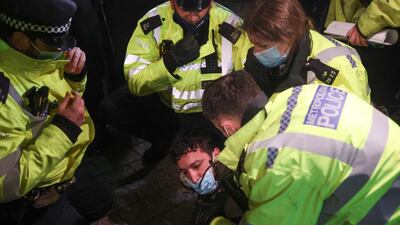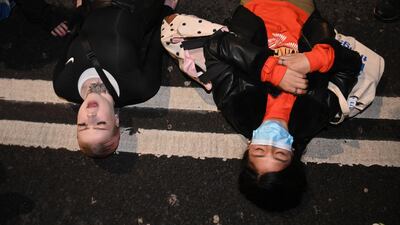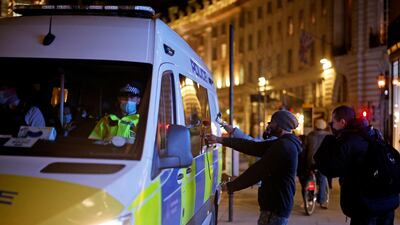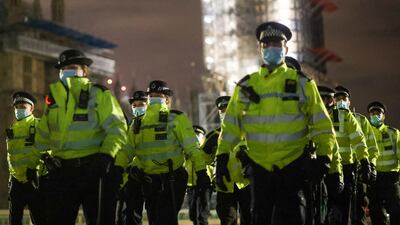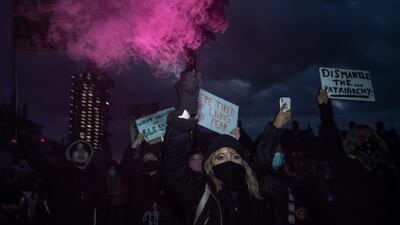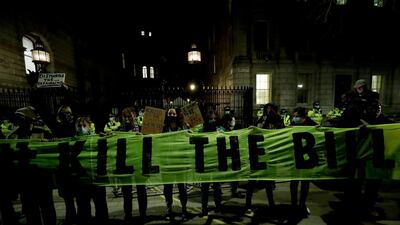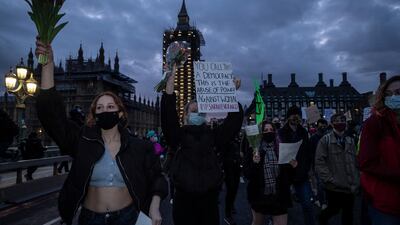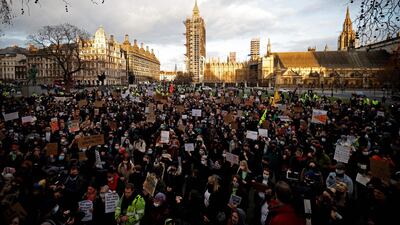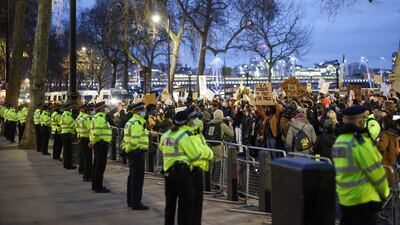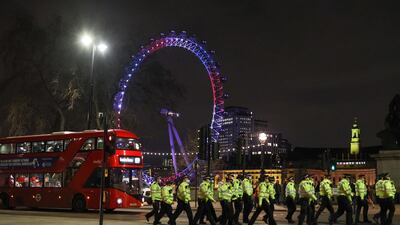Police in London have arrested four people after a third night of demonstrations in the wake of the kidnapping and murder of Sarah Everard.
The protesters were rallying against a new police bill that critics say gives officers too much power to crush peaceful protests.
Chanting "kill the bill," demonstrators convened on the UK parliament as lawmakers debated the proposed law, temporarily blocking traffic on nearby Westminister Bridge before marching on to police headquarters and Prime Minister Boris Johnson's residence at Downing Street.
Monday's protests come on the heels of weekend demonstrations over the death of Everard, who vanished as she was walking home in Clapham in south London on March 3.
A police officer, 48-year-old Wayne Couzens, has been charged with Everard's murder.
Police said officers clamped down on Monday's protests as they did not comply with coronavirus regulations on mass gatherings.
"Whilst I understand why people feel the need to express their views at this time, we must remember that we are still in the middle of a pandemic, and that there is the constant risk of transmitting the coronavirus," Temporary Deputy Assistant Commissioner Jane Connors from the Metropolitan Police said on Tuesday.
“Our officers were once again out on the streets, with the primary role of trying to ensure people’s safety during this health crisis.
“Despite many people adhering to officers’ instructions to leave the area and go home, we had to take some enforcement action as the evening progressed."
Three people were arrested on suspicion of breaching Covid-19 restrictions. Two remain in custody while a third was issued with a fine, police said.
A fourth person was arrested on suspicion of assaulting an emergency worker and remains in custody.
Police issued fines to two more people.
Officers were seen making arrests after telling demonstrators to go home because they were in breach of coronavirus restrictions.
As night fell, the crowd was moved on, with protesters briefly blocking Westminster Bridge before continuing to move around the city to avoid being contained by police.
A group was still looping around the Soho area by 8pm when police stepped in to detain some of them.
British police officers’ decision to break up Saturday's vigil for Everard kicked off a national debate about the government’s power to restrict protests during a public health emergency as well as during normal times.
Images of officers handcuffing women who gathered on Saturday night to demand the authorities do more to protect them has fuelled anger about heavy-handed policing and raised concerns about plans to expand the government’s ability to restrict protests.
“Protest is not a gift, it’s a right,” said Gracie Bradley, interim director of the human rights group Liberty.
“Yes, it can be limited for certain reasons, but those limitations have to be necessary and they have to be proportionate. And what we saw on Saturday was a wholesale failure of the [police] to uphold that duty, to facilitate protest and to actually listen to what protesters were saying, which is that we don’t feel safe in public space.”
The proposed crime bill also extends sentences for serious violent and sexual offenses and toughens penalties for those convicted of defacing statues.
The government said the laws covering demonstrations needed to be changed after last year’s Extinction Rebellion protests in which environmental campaigners sought to shut down central London.
“There is and will remain a balance to be struck between the rights of the protester and the rights of individuals to go about their daily business,” the government said.
“However, there are instances where individuals at a protest behave in a way that causes unjustifiable disruption or distress to others.”
Everard’s killing has galvanised women across Britain to speak out about the barrage of verbal harassment and physical threats they face every day, saying they shouldn’t have to live in fear.
Prime Minister Boris Johnson on Monday called a meeting of his Crime and Justice Taskforce, which includes government ministers, senior police officers and prosecutors, to discuss the issue of women’s safety. Among the items on the agenda is a recent decline in successful prosecutions for rape and sexual assault.
But the opposition Labour Party called on the government to stop talking, toughen penalties for rapists and take action against street harassment and stalking. The party has directed its members to vote against the crime bill, noting that there is not one mention of women in its 296 pages.
“This is a missed opportunity to tackle violence against women and girls that has become endemic in the UK,” David Lammy, Labour’s spokesman on justice, said.
